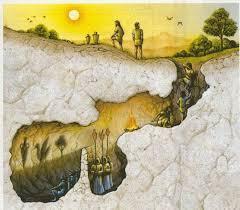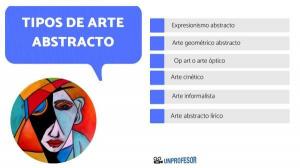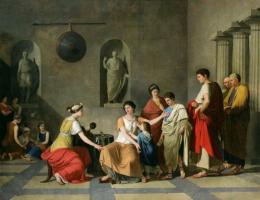Myth of the cave

Image: QueAprendemosHoy.com
In this lesson from a TEACHER, we will summarize the Plato's cave myth and we will talk about its meaning. It appears at the beginning of Book VII of the Republic, and tries to be an explanation about the human being and reality. Thus, for the philosopher, he duplicates the world. On the one hand, there would be the sensible world, the physical world, which is accessed through the senses and the intelligible world, the world of ideas that is accessed through reason. This is what is known as ontological dualism, which leads to its anthropological dualism, that is, to the defense of a double dimension in the human being, the body, associated with the sensible world and the soul, which belongs to the world of ideas.
On the one hand we have toplatonic reality appears divided in two:
- Sensitive world: It is the world of physical objects and as such, it is subject to change, to processes of generation and corruption, and therefore, it is nothing more than appearance. This world is reached through the senses. This world has been constructed by the Demiurge, following the model of the intelligible world, of which it is only a copy.
- Intelligible world: It is the world of immutable and eternal ideas, it is the world of reason, the only true one, although it is true that the sensible world is also real to the extent that it participates in the intelligible world.
Meaning of the myth of the cave
As well, the sensible world would be the cave of which Plato speaks and in which some people are imprisoned and chained, so that they can only see the back wall, without the possibility of ever moving their heads. Behind them, there is a hallway and a bonfire at the entrance, so that when people, animals from outside walk down the hall, they only manage to see their shadows, which projects the fire from the bonfire. The prisoners, thus, think that the shadows are the only reality, since their situation does not allow them to see beyond.
But what if one of these people breaks free of their chains and turns towards the light? That he would see himself before a new reality, a more real, more true, different from the first, which was nothing more than appearance, shadows of the true reality. In this way, this person would be forced to leave the cave, a difficult process and not without effort, since seeing the light for the first time, always hurts the eyes, a process of ascension from the underworld to the outside world, to the world of sunlight, good or knowledge true. This is, therefore, a dialectical process, in which, starting from ignorance, one arrives at the truth. Education will have, in this sense, a fundamental role.
Once the truth is known, this person, must return to the interior of the cavern and communicate it to the rest, even if nobody believes him. The prisoners have been living in darkness for so long that they scoff at the possibility of a different reality. This is why not everyone is prepared to leave the cave behind, to go outside and free themselves from their chains. The return to the cave is dangerous, since helping the human being to know the truth can mean death, just as happened to Plato's teacher, Socrates.

Image: summary, characters and more
Linked to its ontological dualism is its epistemological dualism, according to which there are two types of knowledge:
- True knowledge, science or episteme, whose object is the world of ideas and which is accessed through reason.
- The opinion or doxa, which is reached through the senses.
The ascension of one to the other is possible thanks to a dialectical process, in which the education it will be decisive.

Image: Slideshare
The soul is the most valuable part of the human being and in it they exist 3 parts, although one always dominates over the rest, and each of them is associated with a virtue and a position in the polis. This is li which means justice to the Greek philosopher.
- Rational soul - prudence- rulers (philosopher-king)
- Irascible soul - courage - warriors
- Concupiscible soul - temperance - peasants and merchants.
If you liked this article by a PROFESSOR, share and continue reading more related articles in our Philosophy category.



